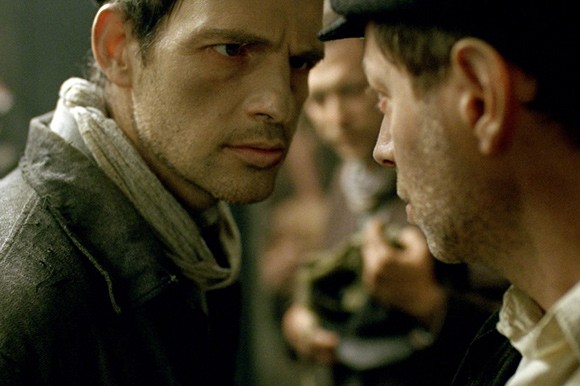While this is a much mined theme the film has such raw power that it cannot fail to connect with its audience and is more than deserving of its Cannes competition slot.
Nemes co-wrote the script together with Clara Royer and the film takes a definitely un-Hollywood view of the Holocaust. The story is told from the point of view of Saul Ausländer played by Géza Rohrig a Hungarian member of the Sonderkommando, the group of Jewish prisoners isolated from the camp and forced to assist the Nazis in the machinery of large-scale extermination. While working in one of the crematoriums, Saul discovers the corpse of a boy he takes for his son. It is not really clear if the corpse is Saul’s son or not but the emotionally brutalised and deadened Saul decides as perhaps an act of moral salvation to save the child's body from the crematorium, and to find a rabbi to recite the mourner’s Kaddish and offer the boy a proper burial. The action carries incredible risk for Saul and no apparent gain other than his own moral feelings.
Told completely for Saul’s point of view with the camera following Saul as if it were his eyes and the images of sickly yellow and green plunging the viewer into an unremitting hell there is no Schindler’s List message of salvation amidst the horror. This is a real vision of hell without hope or future.
The film throws up a controversial dialogue about the degree to which the Sonderkommandos were innocent or guilty of the Nazi crimes their work in the concentration. We see the matter-of-fact approach that Saul and his fellow Sonderkommandos take to their work in the opening scenes of the film as we watch him guide new arrivals into the gas chamber and we hear the screams of the victims followed by Saul and the others removing the bodies and cleaning the chambers for the next group of arrivals. Everything is shown from the point of view of Saul and we relentlessly see the claustrophobic experience of the horror of the camp through his eyes. Shot in 35mm Hungarian cinematographer Matyas Erdely we see everything clearly in the grim foreground and the soft focus of the horrors of the camp blurred into the background. We seem to experience everything through Saul’s eyes and it is a terrifying experience. What Saul and the viewer do not see is made even more terrifying by the screams, clanks and strange noises we hear in the background. There is no music soundtrack.
Nemes worked as an assistant director on Bela Tarr's The Man from London, and the film’s long uninterrupted shots takes and hand held camerawork owe much to the style of Hungarian master.
Another Hungarian talent is actor and poet Géza Rohrig who makes is film acting debut in the film. Much of the time the camera focuses on his unique and expressive face.
While Son of Saul is not for the faint of heart this is a masterful work of cinema and especially more impressive as a feature film debut. It makes the more superficial Hollywood approach to this Nazi created horror seem criminally shallow.
Credits (Hungary, France)
Directed by László Nemes
Cast: Géza Rohrig, Levente Molnar, Urs Rechin, Todd Charmont, Marcin Czarnik, Jerzy Walczak, Sándor Zsoter, Uwe Lauer, Christian Harting, István Pion, Amitai Kedar, Kamil Dobrowolski, Juli Jakab
Production: Laokoon Filmgroup




















